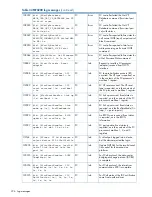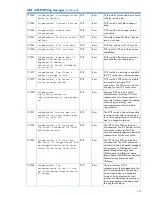
D Log messages
This appendix provides details about messages logged to a file. The message logs are persistent
because they are maintained across router power cycles and reboots. Information in the following
tables is organized as follows:
•
The
ID
column specifies the message identification numbers in ascending order.
•
The
Log Message
column indicates the message text displayed in the MPX200 CLI. Note that:
Log messages for the iSCSI driver module are common to both iSCSI ports. Log messages
beginning with
#0
denote iSCSI port 1 (GE1) and log messages beginning with
#1
denote
iSCSI port 2 (GE2).
◦
◦
Log messages for the FC driver module are common to both FC ports. Log messages
beginning with
#0
denote FC port 1 (FC1) and log messages beginning with
#1
denote
FC port 2 (FC2).
•
The
Module Type
column specifies the message reporting module, where:
App
= Application module (iSCSI, FCIP, or DMS)
◦
◦
FC
= FC driver
◦
FCIP
= FCIP driver
◦
iSCSI
= iSCSI driver
◦
NIC
= NIC module
◦
System
= System module
◦
User
= User module (iSCSI, FCIP, DMS, or WD)
•
The
Msg. Type
column specifies the log message type, where:
Error
= Error log message
◦
◦
Fatal
= Fatal log message
◦
Info
= Informational log message
•
The
Description
column provides additional information about the log message.
Table 34 MPX200 log messages
Description
Msg type
Module
type
Log message
ID
NULL doorbell routine for unloaded
drivers. When a driver is unloaded,
Error
App
QLBA_NullDoorbell: driver
unloaded, port disabled
40967
the doorbell routine is redirected to
this NULL routine.
Processing unsupported ordered tag
task management command.
Error
App
QLBA_ProcessTrb: Processing
unsupported ordered tag command
40996
Processing unsupported head-of-queue
task management command.
Error
App
QLBA_ProcessTrb: Processing
unsupported head of queue tag
command
41004
Unable to create an object for the
target device; exceeded the maximum
number of target devices.
Error
App
QLBA_CreateTargetDeviceObject:
Too many devices
41058
216
Log messages
















































